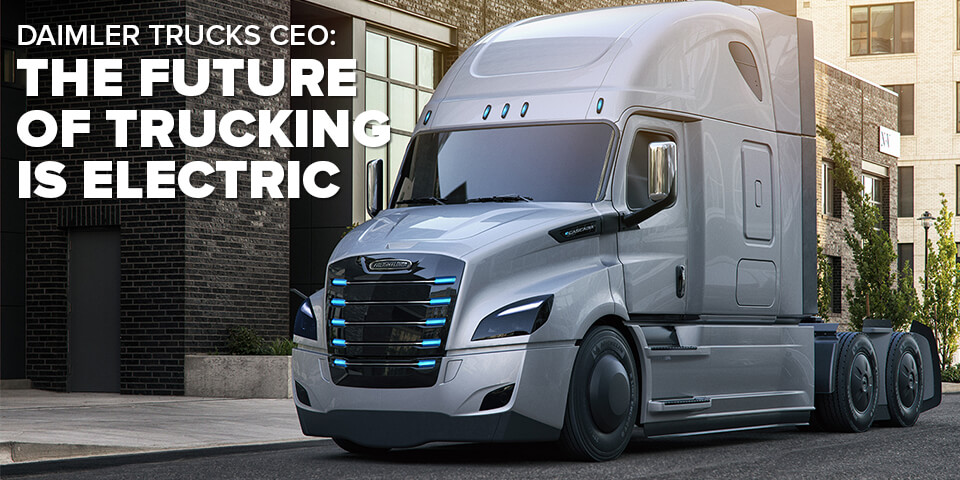
Daimler Trucks CEO: The Future of Trucking is Electric
During his keynote at the ACT Expo in Long Beach, Calif., Roger Nielsen, president and CEO of Daimler Trucks North America (DTNA)-which owns Freightliner-declared that the future of commercial vehicles would be battery electric.
"The road to emissions-free transportation is going to be driven with battery-electric vehicles. I believe the future is electric," says Neilson.
DTNA says that near-zero-emissions natural gas medium- and heavy-duty vehicles are currently available and will continue from Freightliner as an interim solution until full commercialization of the battery-electric Freightliner eM2 and eCascadia.
The Freightliner eM2 truck is an electrified solution for local distribution, pickup and delivery, food and beverage delivery, and last-mile logistics applications. And the eCascadia is a Class 8 tractor designed for local and regional distribution and drayage. Both trucks will begin production in 2021.
Is Neilsen right? As an expedite owner-operator or fleet owner, how seriously should you take this? Will the next truck you purchase be electric?
Electric Trends
Based on what I saw and learned at the NTEA Work Truck Show in March, Neilsen is correct about the direction-the industry appears to be headed toward an electric future. But a lot of work still needs to be done for that future to become a mainstream reality anytime soon.
Here's what I mean.
Electrification is building momentum because the cost of battery technology has been trending downward to the point where electrified trucks are becoming a more attractive and financially viable option for larger commercial fleets to try.
According to Bloomberg's New Energy Finance report, lithium-ion battery prices have fallen 73-percent per kilowatt-hour since 2010. And that trend is expected to continue till EVs become cheaper to buy than their fossil-fuel-powered counterparts by 2025 to 2029.
And as battery costs have dropped, this has allowed for more affordable power that extends the battery range between charges, making it comparable to the range of conventional-fueled vehicles-and, thus, more acceptable for more fleet applications.
That's why we're seeing a growing number of OEMs like Tesla, Freightliner, Mitsubishi Fuso, and, now, Ford (with its recent $500 million investment in Rivian to produce an all-electric pickup truck) enter the fray.
But here's the challenge: Charging infrastructure. There's not enough of it.
After all, what happens when you have tens of thousands, hundreds of thousands, or even millions of vehicles that need to be charged-most of them at the same time-putting massive amounts of stress on the existing grid and infrastructure?
What will be the impact on the cost of electricity-and thus, the cost of "fueling"? Will there be any stability in pricing so that consumers and fleets alike can budget and plan?
There was a lot of talk at the Work Truck Show about the need for greater collaboration among fleets, regulators, automakers, and utility companies to work towards a solution-to build out charging infrastructure that's sufficient, stable, and affordable enough to meet demand.
Daimler's Plan
Neilsen agrees that all stakeholders need to work together and, at the ACT Expo, outlined three goals that must be achieved to accelerate the arrival of electric trucks.
Goal #1.
The industry must work together to establish a common battery-electric vehicle charging infrastructure. Daimler AG is a founding member of CharIn, an organization that aims to standardize charging requirements for electric vehicles.
Goal #2.
Batteries must become cheaper, lighter, and more powerful.
Goal #3.
Strengthen the business case of electric trucks through increased incentives, decreased maintenance costs, and cheaper energy costs.
The Bottom Line
So, while the future of the commercial truck industry appears to be electric, the question is: When will that happen? When will it impact your business as an expediter?
The odds are strong that your next truck will NOT be battery-electric. But watch the developments in charging infrastructure. That will give you an accurate gauge as to when mainstream adoption will become possible-and when you'll be seriously considering an electric truck.
